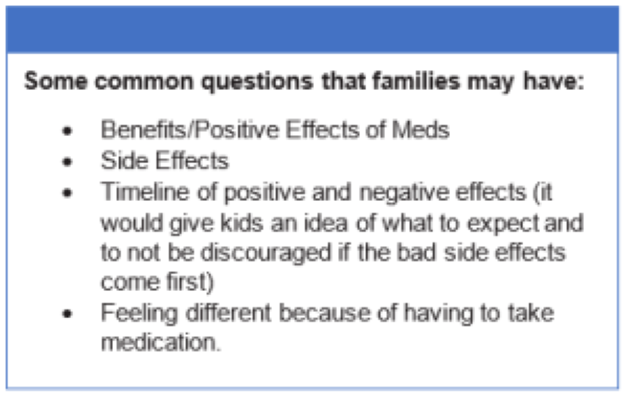Starting psychotropic medications: engaging patients and families in the process

1

In the primary care setting, children often present with acute psychiatric symptoms that greatly impair their functioning or put them at risk of harm to self or others. Pediatric clinicians may consider prescribing psychotropic medication in addition to therapeutic interventions to stabilize a mental health condition (1). However, parents and patients may have concerns about starting psychopharmacological treatment.
To help them feel more comfortable with this intervention, be sure to review screening tool results regarding diagnosis and level of severity. Also, be sure to consider evidence-based medication treatment, risks and benefits of using and not using a medication, using the lowest effective dose possible, and using one drug at a time to decrease the risk of side effects. Discuss plans for regular monitoring and follow-up appointments, as well as how to get help in case of an emergency (3).
To improve compliance and manage expectations, be transparent from the beginning about the importance of medication adherence and the possibility of needing to explore different medications and doses for optimal therapeutic effect (2). Treat patients and parents with respect. Include the pediatric patient in the conversation no matter the age. Relate to them at their developmental level, and as a person not as a label. Demonstrate great care with the family to show the child’s strengths and potential are appreciated and that the psychiatric disorder does not define the child (3).
2

Make positive connections with families. One way to demonstrate compassion is by preparing to respond to a common parent’s question: ”What would you do if this was your child?”(3) It is important to promote open communication by allowing time for questions. It might be helpful to provide families with the below resources from AACAP and Child Mind to facilitate this conversation.
Prescribing medications may not be in the scope of practice for some clinicians. If medications are considered by primary care providers, collaboration with a psychiatrist is essential for ensuring high-quality care (1). Illinois DocAssist is always available to you, at no cost, to provide psychiatric consultation on your pediatric and perinatal patients.
3
Resources
Parent Medication Guides: The American Academy of Child and Adolescent Psychiatry (AACAP) and the American Psychiatric Association (APA) have developed Parents’ Medication Guides to help individuals make informed decisions about treating mental disorders in children and adolescents.
Child Mind Institute is a resource for patients and parents regarding a variety of mental health topics. In their article, “Questions to Ask a Doctor Prescribing Medication to Your Child,” they provide tips for minimizing side effects and getting good results.
References
- Harrison JN, Cluxton-Keller F, Gross D. Antipsychotic medication prescribing trends in children and adolescents. J Pediatr Health Care. 2012 Mar;26(2):139-45. doi: 10.1016/j.pedhc.2011.10.009. PMID: 22360933; PMCID: PMC3778027.
- Weinstein, 2015 J Am Acad Child Adolesc Psychiatry 2015;54(2):116–125
- Sparrow, 2008 What To Expect From The Doctor Prescribing Psychotropic Medication. https://www.pbs.org/wgbh/pages/frontline/medicatedchild/parents/